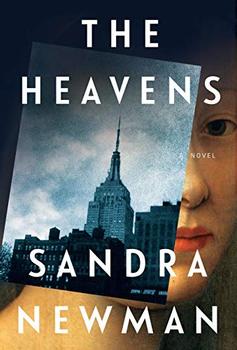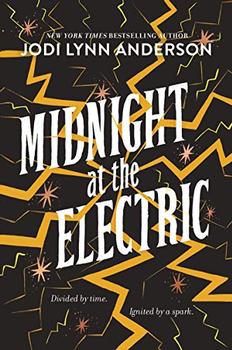Summary | Excerpt | Reviews | Beyond the book | Read-Alikes | Genres & Themes | Author Bio

On the eve of her high school graduation, Glory O'Brien drinks the ashes of a dead bat. Yes. I wrote that right. And you read it right, too. She drinks bat ashes. More specifically, she and her on-again off-again best friend, Ellie, swirl the ashes into a beer and gulp them down. Afterward, they both begin to receive "transmissions" from any person with whom they come into contact. Specifically, Glory peeks into visions of people's pasts, from many generations ago; and she also sees visions of their futures. It's not pretty. Not by any stretch of the imagination.
Glory's present life is not pretty either. Her mother committed suicide 13 years earlier – by sticking her head in the oven – and Glory has spent her time since then not dealing with it. Ellie won't talk about it, and neither will Glory's father. In fact, he refuses to get another oven, so Glory only eats microwaveable meals. She also constantly worries, wondering if she is headed in the same direction as her mother. Glory is a photographer, just like her mother was. And Glory finds herself very much outside the social circles – all of them – that permeate her typical public high school.
A. S. King is back with her signature style – contemporary, edgy realism with a touch of magic. But just like each of her previous novels (Reality Boy, 2013; Ask the Passengers, 2012; Please Ignore Vera Dietz, 2011 to name a few), the specific magic and the central character are both unique. After all, in Glory O'Brien's History of the Future, the protagonist has visions after drinking a bat. In Ask the Passengers, the protagonist Astrid talks to the philosopher Socrates and the novel's short chapters present the points of view of random passengers on airplanes flying over Astrid's house who seem to "catch" the love that Astrid projects up to them. King's stories are not odd for the sake of it, though. Somehow her strange and magical choices make the characters feel more real. King is able to get at the deep inner struggles teens experience without getting sentimental or overly dramatic or succumbing to some easy plot device.
Back to Glory's bat-induced visions: through transmissions from various people, she pieces together that in the not-too-distant future, a second civil war will break out in the United States. One that centers on a government-sanctioned misogyny: women are not allowed to work. And that is only the tip of the iceberg. It gets pretty dark and ugly. Glory decides to write down everything she discovers in hopes that it will be useful to future generations. What she finds, though, is that it is useful to her. Now. In writing about the future of America, she questions whether she, too, might have a future. And until this point, she hasn't contemplated that possibility. This is what I mean about King's brilliant story structure and imagination. This truly weird plot choice – drinking a bat – forces Glory to access her own emotions and face her fears. King has created an organic and creative way into her head and heart.
In college, King majored in photography, specializing in archival printing. Her knowledge of this art form creates details in this story that shine. Glory's obsession with photography is a strong metaphor for her struggles: "There is a moment in every photograph's life when it has been exposed but not developed," she writes, "The light from the enlarger has shone through the negative and made its impression on the paper, but without the magic of developer, the paper will stay white and no one will ever see what the impression is." Glory is that piece of paper. As she says, she is "exposed but not developed." Another highlight of Glory O'Brien's History of the Future is Glory's relationship with her father, which is complicated, fascinating and full of love. (In a genre in which many writers try to get rid of the parents so the teens can have the story to themselves, King does parents well.) In one poignant scene after Glory and her father finally talk a bit about her mother, King writes: "We cried. Then we hugged. Then we blew our noses and he made the elephant sound he always makes when he blows his nose and it annoyed me like it does every time. And then we laughed because he knew he'd annoyed me." In this simple instance, the love and comfort between Glory and her father become crystal clear.
Says King in an interview in Publisher's Weekly: "I love that time in teenagers' lives when they're approaching a big change and you see a kid go for it." This love resonates throughout the pages of Glory O'Brien's History of the Future. King does the teenage "big change" moment exceedingly well. She is positive and hopeful in the process too. She also believes in the intelligence of today's teens. Her respect for this time of life is palpable.
Along with the transmissions about history and the future, the bat offers Glory two sentences: Free yourself. Have the courage. The bat gives her this challenge. King gives her readers this challenge too. Free yourself. Have the courage. The world is full of societal pressures and rules, and legacies and history. Who are we, despite all that, and can we reveal our true selves to the world? It is a challenge worth taking on. This novel is especially written for teens ages 14 and up, but adults will get a lot out of it too. Particularly women.
![]() This review
first ran in the November 5, 2014
issue of BookBrowse Recommends.
This review
first ran in the November 5, 2014
issue of BookBrowse Recommends.

If you liked Glory O'Brien's History of the Future, try these:

by Sandra Newman
Published 2019
Transporting the reader between a richly detailed past and a frighteningly possible future, The Heavens is a powerful reminder of the consequences of our actions, a poignant testament to how the people we love are destined to change, and a masterful exploration of the power of dreams.

by Jodi Lynn Anderson
Published 2019
New York Times bestselling author Jodi Lynn Anderson's epic tale - told through three unforgettable points of view - is a masterful exploration of how love, determination, and hope can change a person's fate.
Great political questions stir the deepest nature of one-half the nation, but they pass far above and over the ...
Click Here to find out who said this, as well as discovering other famous literary quotes!
Your guide toexceptional books
BookBrowse seeks out and recommends the best in contemporary fiction and nonfiction—books that not only engage and entertain but also deepen our understanding of ourselves and the world around us.